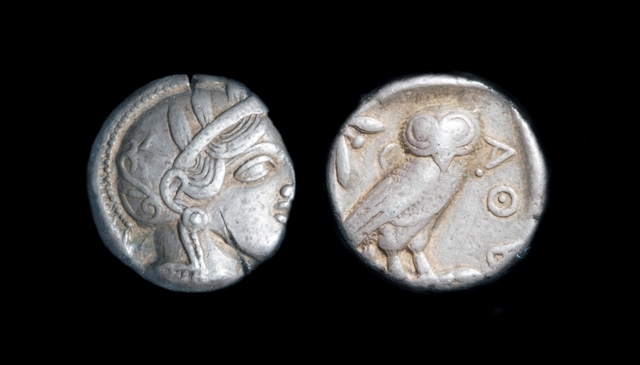Athens, Silver Tetradrachm
Dublin Core
Title
Athens, Silver Tetradrachm
Subject
Athens, Attica. Silver Tetradrachm, 450-440 BCE.
OBVERSE: Archaic head of Athena facing right. Her Attic helmet is decorated with a diadem of three olive leaves. Test cuts in Athena's throat and cheek.
REVERSE: Archaic owl, slightly off-center to the left. In upper left, sprig of olive with two leaves and one berry in the center and a crescent that almost touches the shoulder and head of the owl. Inscription on the right: "AQE" (= Athenaion, "of the Athenians").
OBVERSE: Archaic head of Athena facing right. Her Attic helmet is decorated with a diadem of three olive leaves. Test cuts in Athena's throat and cheek.
REVERSE: Archaic owl, slightly off-center to the left. In upper left, sprig of olive with two leaves and one berry in the center and a crescent that almost touches the shoulder and head of the owl. Inscription on the right: "AQE" (= Athenaion, "of the Athenians").
Description
The Athenian “owl” is one of the most recognizable coins of the ancient world. First minted in 515 BCE, the “owl,” featuring Athena on the obverse and, her symbol, the owl, on the reverse, was continually minted by the Athenians until they gave up their last silver coinage in the first century BCE. The coins were made of very pure Laurion silver, and thus were considered to be of very high quality and were greatly valued around the ancient world. Hoards of them have been found far from Athens: Yemen and Afghanistan being just a couple of examples.
This coin, though minted in the Classical period, still has some Archaic features: the almond eyes and slight “Archaic” smile. The stylized olive leaves crowning Athena’s Attic helmet may be commemorating the battle of Salamis in 480 BCE. The Athenian navy, under Themistocles, defeated the fleet of Xerxes during the second and last Persian attempt to invade Greece.
This coin, though minted in the Classical period, still has some Archaic features: the almond eyes and slight “Archaic” smile. The stylized olive leaves crowning Athena’s Attic helmet may be commemorating the battle of Salamis in 480 BCE. The Athenian navy, under Themistocles, defeated the fleet of Xerxes during the second and last Persian attempt to invade Greece.
Source
Gift of James and Aneta McIntyre, Hallie Ford Museum of Art, Salem, OR. 2006.010.006
Date
ca. 450-440 BCE
Rights
Hallie Ford Museum of Art
Format
2.320 cm
17.000 gr
17.000 gr
Language
Greek
Type
Coin
Identifier
Athenian owl
Coverage
This item is on view at the Hallie Ford Museum of Art, in the Mark and Janeth Sponenburgh Gallery.
Citation
“Athens, Silver Tetradrachm,” Hallie Ford Museum of Art Exhibits, accessed February 17, 2026, https://library.willamette.edu/hfma/omeka/items/show/57.
